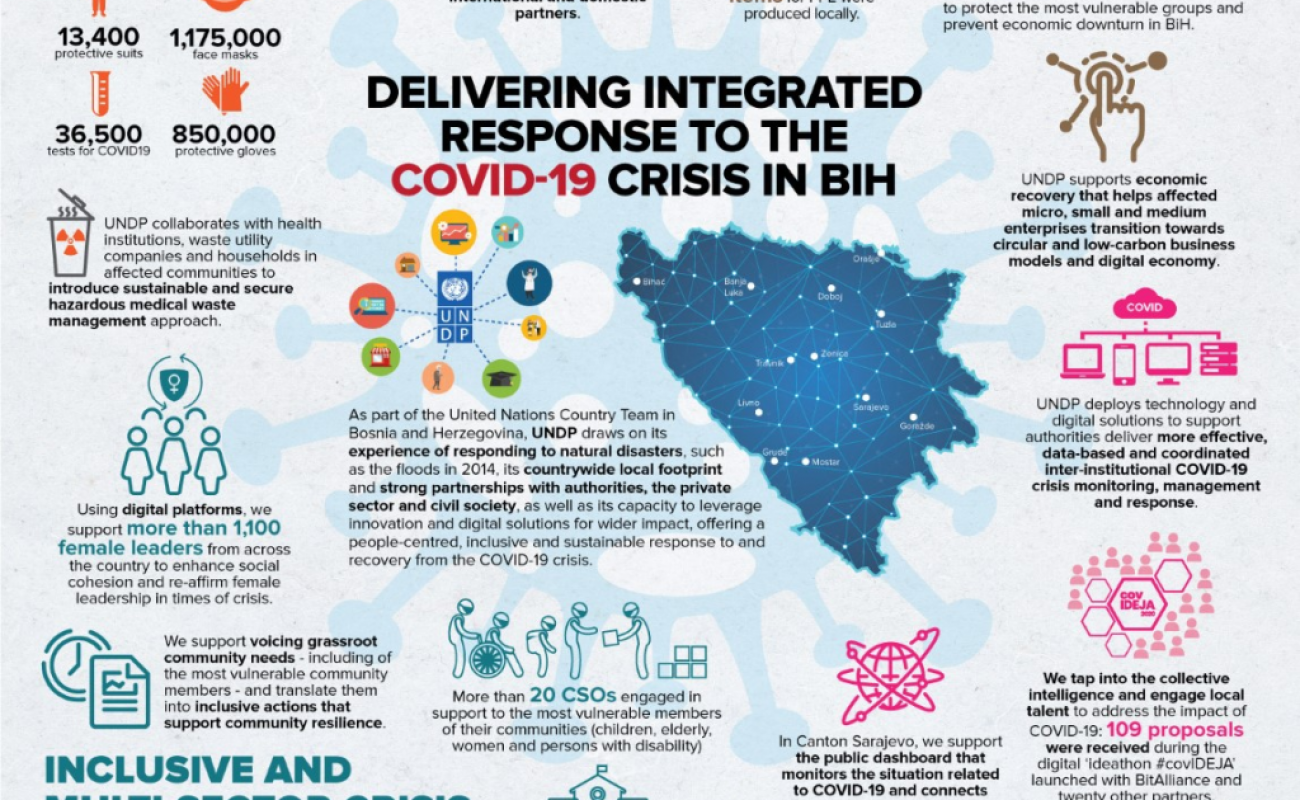UNDP’s support to the COVID-19 response in BiH
Humanity needs leadership and solidarity to defeat COVID-19

UNDP’s Integrated Response
The COVID-19 pandemic is a massive health crisis. It is also a humanitarian and development crisis that threatens to leave deep social, economic, and political scars in the years to come, particularly for the poorest and most vulnerable countries. A global threat of this magnitude requires global solidarity to support the most vulnerable countries as they cope with this unfolding crisis.
Since begining of the COVID-19 pandemic in Bosnia and Herzegovina United Nations Development Programme (UNDP), as part of joint and coordinated response of the United Nations, actively supports domestic authorities and health institutions accross government levels in addressing the crisis. As part of its mission to eradicate poverty, reduce inequalities and build resilience to crisis and shocks and working at the heart of the United Nations family in close coordination with the World Health Organization (WHO), the UNDP is supporting countries accross the globe prepare for, respond to and recover from the COVID-19 pandemic, focusing particularly on the most vulnerable.
UNDP is fully operational in 170 countries and territories and focused on COVID-19 response. We are mobilizing all our assets to respond to this unprecedented challenge. We have transitioned all critical operations to digital and virtual platforms, enabling our teams to continue delivering effectively despite restrictions on movement and physical interaction. We are streamlining policies and procedures for greater agility, increasing our flexibility to receive and deliver private sector and other financing, and taking steps to ensure our frontline staff are well supported and cared for as they help countries through this crisis.
As part of the UN joint efforts, in collaboration with the WHO and other international agencies and organizations, UNDP aims to strengthen the health system throughout Bosnia and Herzegovina by supporting procurement and delivery of the most needed medical equipment and supplies necessary for testing and treating persons infected with the Corona virus, and ensuring the conditions for safe and uninterrupted operation of medical staff and other competent services throughout the country. To achieve this, we established internal response team covering key areas of work in response to COVID-19 pandemic: support to medical procurement, coordination, economic impact assessment and support to social impact assessment. At the country level, coordination with Resident Coordinator's Office and other UN agencies is ensured trough the UN Crisis Management Team.
We work closely with governments and health institutions at all levels: state, entity, and cantonal, in order to gain accurate and comprehensive insights into actual medical needs and priorities, with the lead and expertise of the WHO. Existing capacities of health institutions and the needs of the most vulnerable and most at risk communities and populations will be taken into account, to ensure that no one is left behind.
We will support setting up a multisectoral whole-of-society approach to face the challenges beyond the health sector, to limit the spread of COVID-19 and to mitigate the potentially devastating impact it may have on vulnerable populations and economies.
COVID-19 - More Than a Health Crisis
This pandemic is a massive health crisis. COVID-19 has disrupted billions of lives and endangered the global economy. It is also a humanitarian and development crisis that threatens to leave deep social, economic, and political scars in the years to come, particularly for the poorest and most vulnerable countries. A global recession – perhaps of record dimensions – is a near certainty.
UNDP is already working to understand the social, economic and political impacts of the crisis, and to find ways to mitigate them with sustainable, resilient and rights-based solutions crafted with the public and private sectors.
This leverages our capacity on innovation, digital solutions, social protection systems, response to increased gender-based violence, emergency job creation and economic restoration. Examples include scaling up digital solutions for health care, financing and other services, designing targeted social protection for marginalized groups, develop women’s economic empowerment strategies, and developing fiscal policy and SDG-aligned financing mechanisms with partner governments.
In response to the quickly evolving COVID-19 crisis in Bosnia-Herzegovina, the UN Country Team is supporting the authorities and country through assessments of the socio-economic impacts of the COVID-19 crisis. A Task Force on the socio-economic impact of COVID-19 is established, consistent with the guidelines outlined in WHO’s COVID-19 Partnership Platform. The Task Force, which is co-chaired by UNDP and UNICEF, will engage in all relevant streams of work e.g. social, economic, health-related and human rights.
Digital Transformation - an Emerging Opportunity
Digital transformation is already a reality in Europe and Central Asia, as UNDP and many governments have begun to transfer legal, social and civil service delivery online. UNDP is helping countries and businesses quickly leverage digital technologies and shift necessary services online, so that everyone can continue doing business despite the increasing need to isolate and limit exposure.
Accelerated digitalization can be expected to create new business models and opportunities for digital leapfrogging in traditional industries. UNDP is actively supporting Canton Sarajevo with digital solutions to help public authorities dealing with the crisis to have better data, improve monitoring and support decision-making. Same digital solutions, once piloted, may be replicated throughout the country.
Financial Contributions to Response to the COVID-19 Pandemic
Globally, a COVID-19 Rapid Response Facility has been launched, funded by existing resources and capitalized with an initial US$20 million. This facility will provide up to $250,000 per country for initial action, disbursed through a fast-track mechanism with approval within one week. UNDP intends to unlock additional resources by repurposing unspent programme funding, in consultation with host country governments and donors as appropriate.
In Bosnia and Herzegovina, UNDP supports purchase of immediate medical goods and supplies with funding allocated by various international and domestic donors, authorities and partners, confirming their confidence in UNDP's role as a partner of choice for executing complex tasks at the time of crisis.
